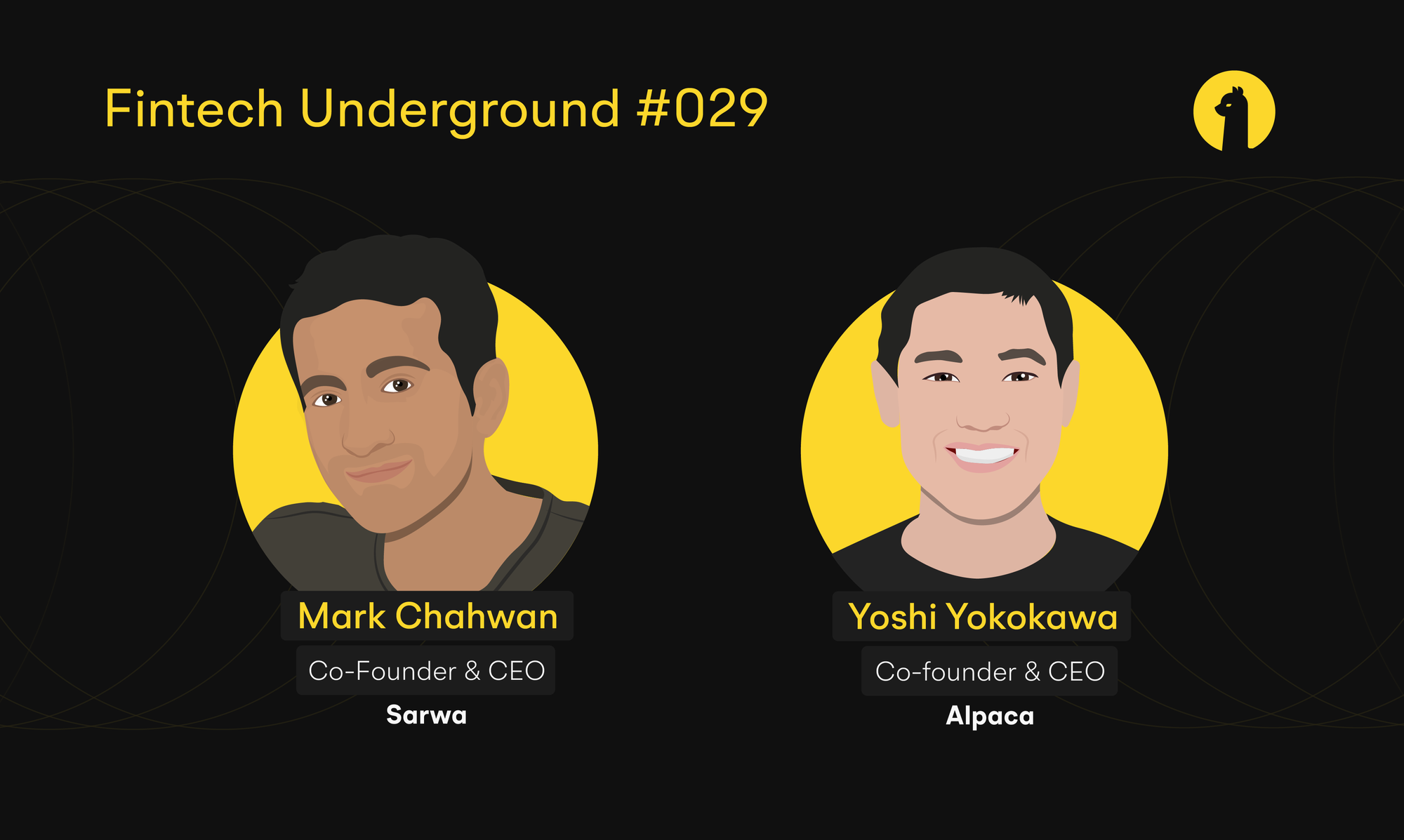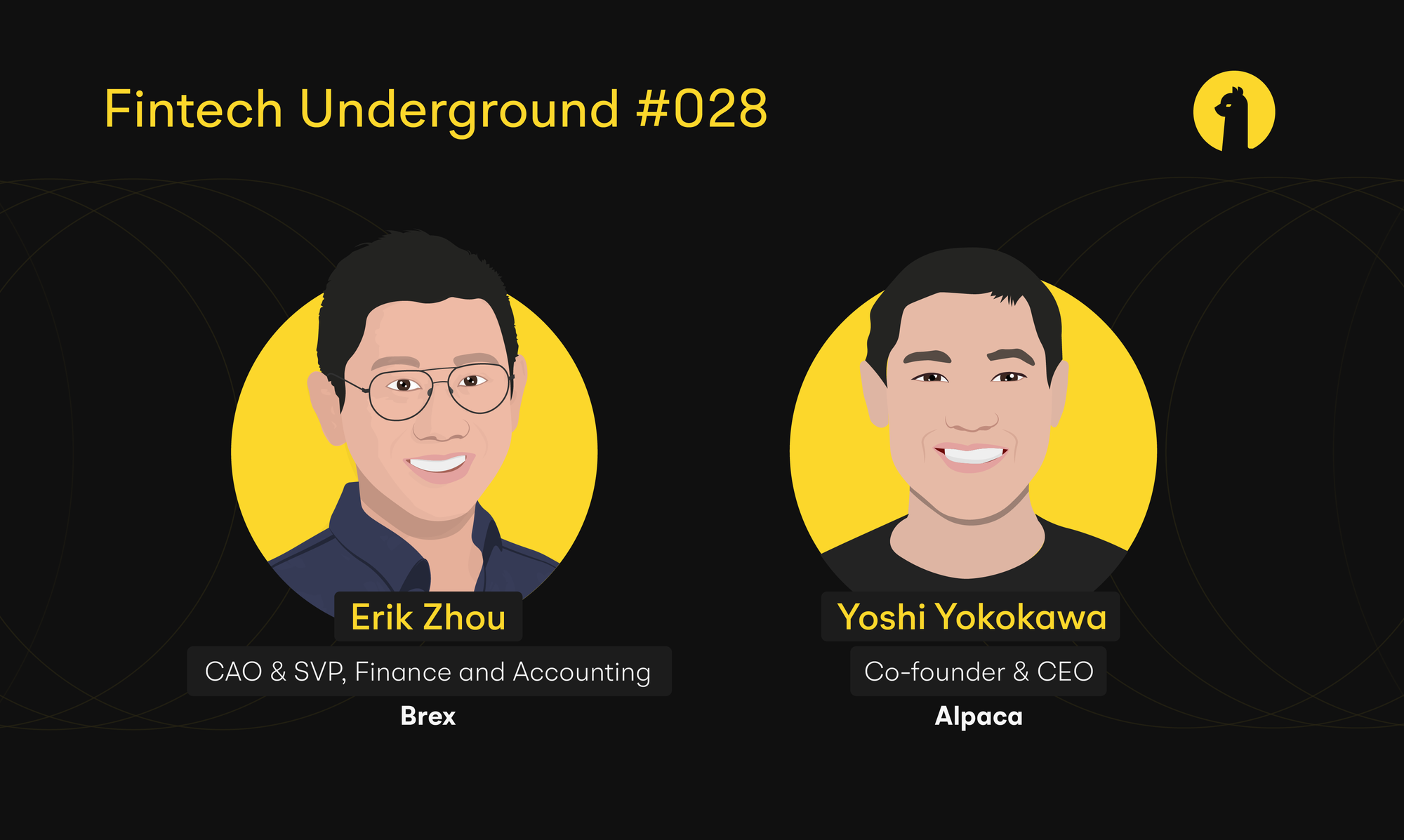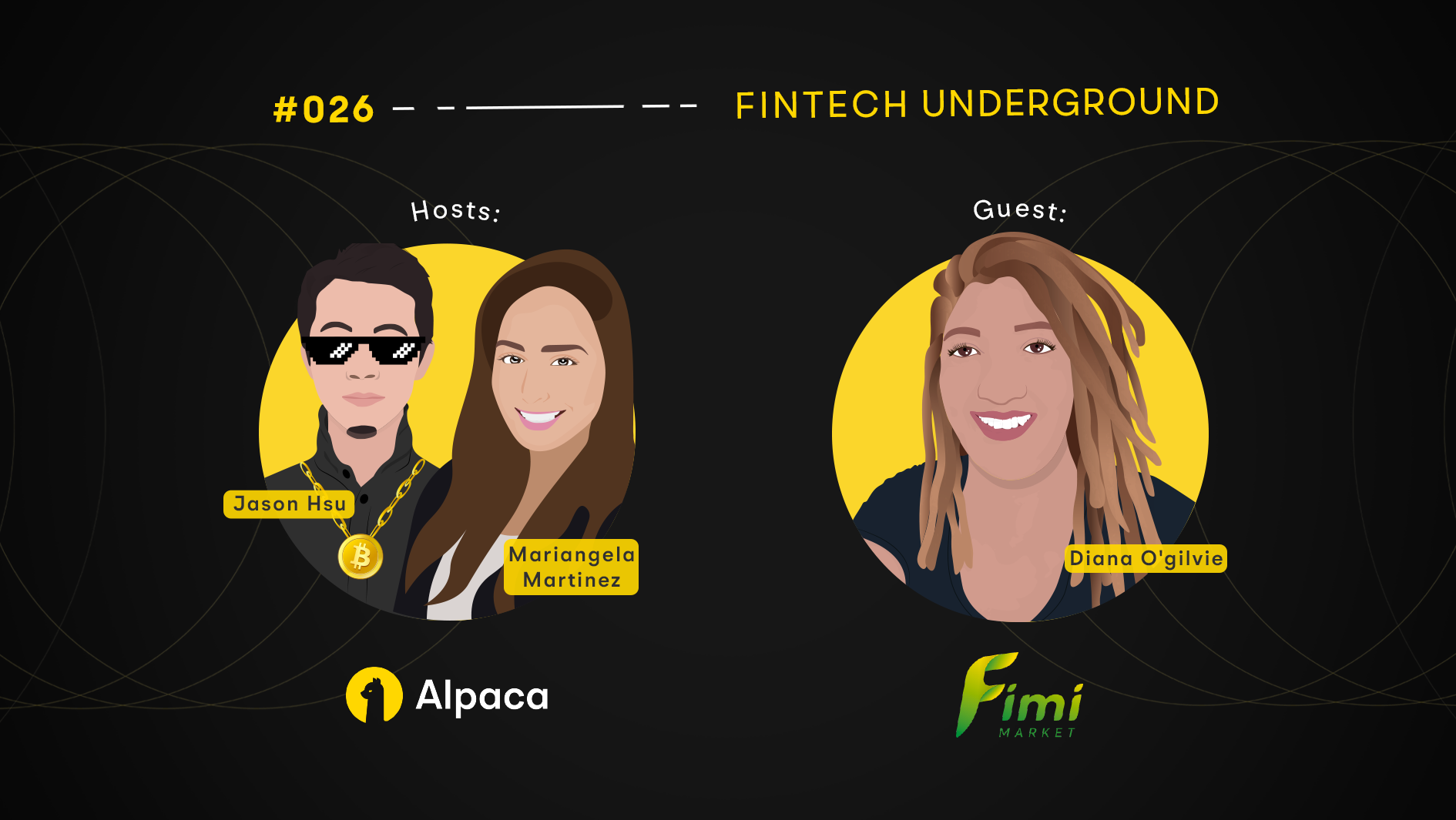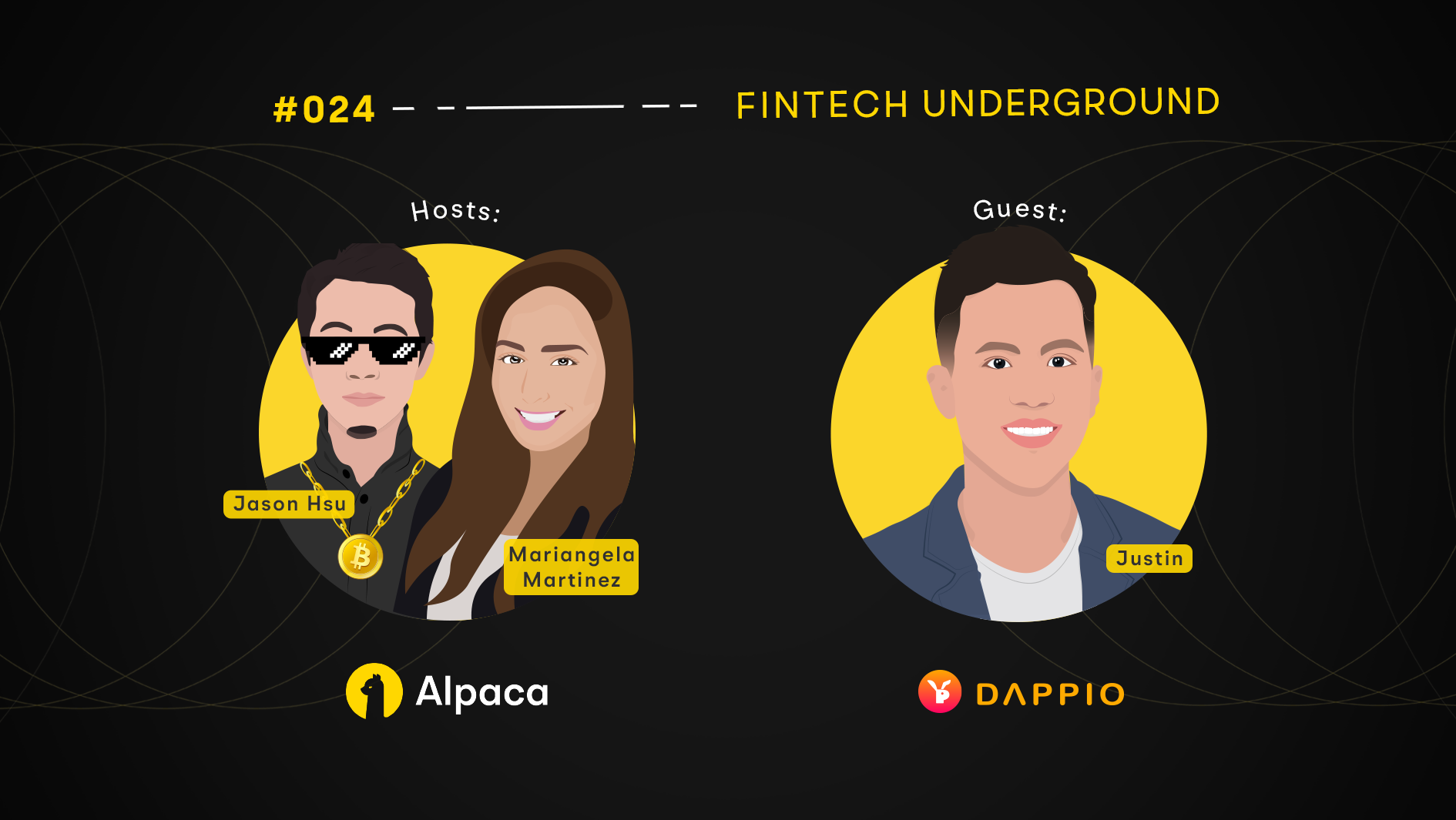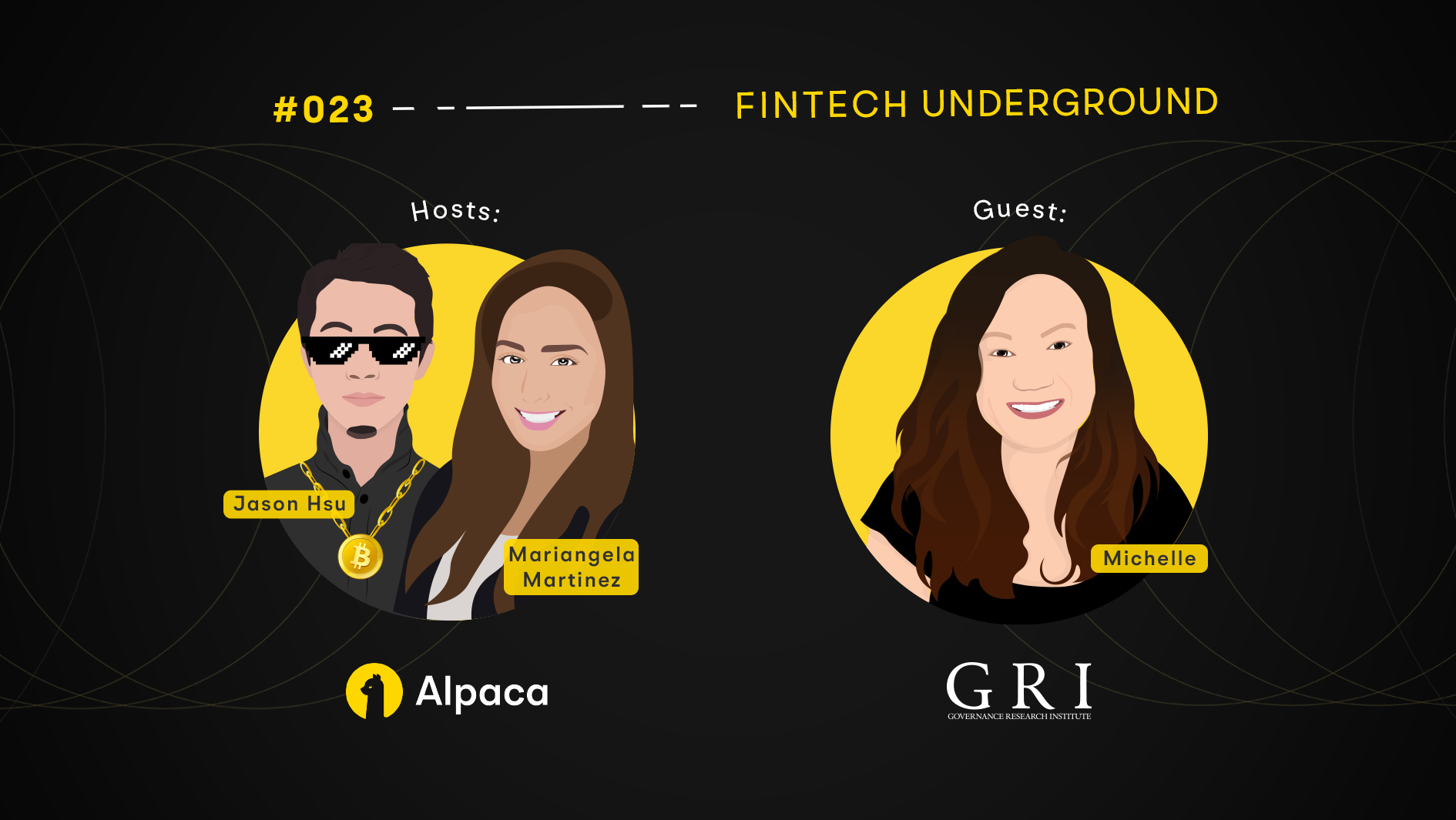Any opinions expressed are opinions of the host and their guests. Alpaca Securities LLC does not recommend any specific investments or investment strategies.
Fintech Underground by Alpaca is a podcast devoted to all topics related to stock trading and APIs. From trading with algorithms or connecting apps or building out services, we aim to bring light to the different corners of Fintech.

TL;DR
On our second episode of Fintech Underground by Alpaca we interviewed Remy Astie. As the founder and CEO of VAUBAN, the world's first wealth container platform, Remy discusses his views of the Fintech Industry along with his experiences at and before VAUBAN.

Summary
Coming from a strong entrepreneurial background, Remy Astie joins us to discuss his background leading up to and at Vauban. From starting a fashion intelligence app for frequent shoppers to launching Vauban, a wealth container platform, Remy shares his experience in the entrepreneurial space. Not only this, but he includes the ups and downs of being a tech entrepreneur such as judging whether the product-market fit is strong enough when launching. Finally, he shares an overview of the challenges aspiring fund managers can face when forming their legal structures. Despite the challenges, however, Remy explains that while tough the Fintech industry is quite rewarding.
Find the full transcript below. To hear more CEO/Founders of the most interesting Fintech companies speak about their experience in the industry check out our other episodes below:
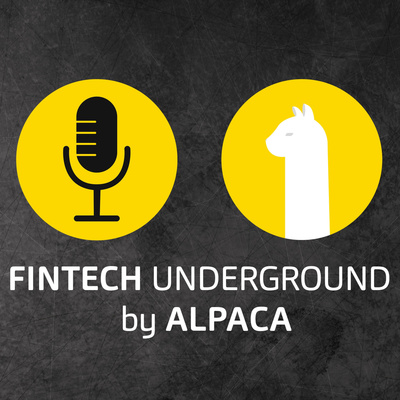
Full Transcript
[00:00:00] Jason: Welcome to FinTech Underground by Alpaca, a podcast devoted to stock trading API from trading with algorithms to connecting apps, to building out services. Alpaca is built for developers and traders. And with that being said, let's get started. Hello everybody. Welcome back to FinTech underground by Alpaca.
[00:00:17] In each episode, we aim to explore a different area within FinTech. I'm incredibly excited for today's episode, featuring Remy the founder and CEO of Vauban, the world's first wealth container platform. As usual, I would like to introduce our host Yoshi CEO and co-founder of alpaca an API stock brokerage.
[00:00:36] I really cannot wait to hear what you guys have in store for today's episode. Let's get started
[00:00:41] Yoshi: Hey Welcome Remy for the podcast. How are you, Remy?
[00:00:46] Remy: Yeah, I'm good. Thanks for having me.
[00:00:49] Yoshi: Yeah. Great, great. You know, I appreciate this, like, you know, we have been talking with different FinTech entrepreneurs. And I think I'm super excited to talk with you today because really, like, I feel like, you know, you are in the space and like solving the problems where that's not necessarily visible, but like yet super important to compose this you know, FinTech ecosystem.
[00:01:14]So Remy, like, do you want to start off with explaining why you do the Vauban and like, you know, how you came up with the idea that what you do right now?
[00:01:24] Remy: So I went to uni, in France in Western France. This is also where I met Ulric, my cofounder. So yeah, we had a lot of I wouldn't say companies, but websites together or, you know, iPhone apps, et cetera.
[00:01:37] Like we've always been creating and, you know yeah. Like websites, et cetera, tech businesses a lot together. None of them really got somewhere where they could raise a lot of money and, and, and, and hyper-growth et cetera. So we. Got to specialize in two different ways. So Ulric kind of went to more on the, you know, applied math and like mathematical finance side of things and it was called financial engineering.
[00:02:01] And you need to realize, it is much more finance than engineering actually. And essentially doing that, I wrote a master thesis. So essentially it was like a model of a clearinghouse production. So that was 2015, 2016. So that was, you know, the first version of etherum. That was very, very, very early everyone that asked me if I bought a lot of Bitcoin back then.
[00:02:21] And unfortunately I didn't. And, but essentially doing that, I talked to, you know, I think I got aware all of two old businesses in the world that were doing something with blockchain and capital markets at that time, or, you know, the vast majority of them because there weren't many. And one of them, where they were trying to do, was to essentially digitize private company shares to make them tradable you know, in an easy way.
[00:02:43] And that's how I kind of got to work in all that universe, I got to work for them. And then, you know, I saw that they were a lot of inefficiencies, not in creating normal companies, but in setting up investment vehicles. So, you know, a lot of people were coming forward, you know, they wanted to launch their own hedge fund, or their own venture fund, their own, you know, P fund.
[00:03:04] They wanted to start here with friends, et cetera. And that's really where the pain starts. So, you know, it's an industry where there's absolutely no focus on the customer. That's, that's really a concept that doesn't exist at all. It always goes from. You know you to the client and never the other way around. So the experience is really, really, really awful.
[00:03:25] And, you know, the vast majority of people, you know, would agree yet the experience is broken. It's extremely expensive, extremely hard. Extremely time-consuming, which means that the vast majority of people that want to launch investment vehicles, they ended up just not doing it because of it, because it's so hard.
[00:03:42] So that's kind of when I talked, I call back Ulric. So we had a blog at that time together. So we were still in touch and said, I think it's an opportunity. And we got to focus full-time on that. So the approach we took was to think deeply about what an investment vehicle is, you know, In essence, what's a hedge fund, P fund, a VC fund et cetera.
[00:04:04] And I mean, we could see essentially. It's not that complex. So we took that and we sort of replicated that digitally and what we are today. So, you know, we created this sort of digital version of, you know, asset holding legal entity, which is the wealth container. And you can go on, on the platform today and, you know, create an investment vehicle and start fundraising.
[00:04:26] Money from, you know, friends and family or more and, you know, start investing, sweet. That's how I, that's what we do. And that's how we got there.
[00:04:35] Yoshi: Yeah. So I think like, you know your website, does say really well, the easiest way to launch your funds and SPVs. And I think that this is somewhat normal between you and us.
[00:04:47] Is because like, we know that like, you know, you have to raise funds, you actually need to incorporate something instead of like, Oh, you just need to receive money from your friends and family and start trading or investing stuff. Could you explain a little bit about why even like, you know, you have to set up this kind of legal entity, because like, I think for most of the people, I think this idea of doing that itself is even foreign in a way.
[00:05:12]So could you like explain, like why you even cannot just, you know, get the money from you know, your families and like know friends and start trading? Like what kind of a legal hurdle that like, you know, people, you know, get into just like, you know, education one-on-one.
[00:05:27] Remy: It's a very good question, actually.
[00:05:29] So to make up several things, but the main thing is that you know, you should just ask your friend, Oh yeah. Can you wire me some money? I'll invest in you when I give it back to you, you know, you want some sort of comfort that is going to give you back the money. And essentially this is the. You know, it's like a big contract, right?
[00:05:46] These are legal entities that say okay, you give me a hundred thousand dollars and you know, I'm going to take 20% of any profits. I make you above that a hundred thousand dollars. So that's the first reason. There's also a reason for limited liability. Which is that, you know, you're going to use this entity, this container, which is going to raise money and then invest on, you know, the stock market or anywhere.
[00:06:10] But there's a limited liability element, which means that whether it's you or your investors, can't lose more than the capital that there is in this container. And that's yeah, that's a very, very important thing that, you know, people don't risk all of their personal assets. So yeah, I would say these are the two main reasons why it's structured in that way.
[00:06:30] Yoshi: Yeah. I mean, like, this is a serious problem. I think that like a lot of people don't understand that because like, you know, now FinTech applications, you can just send the money so easily and they feel like, Oh, why don't you just, you know, send the money to me. And like more to start trading. I feel like, you know, I actually get asked that kind of question from even our user base.
[00:06:50] Like, you know, okay. I'm making money in trading. So like, you know, I'm actually want to use the money from my friends and do the trading. So I think like, you know, the first thing first, no, like you really cannot do that. Right. And like, I feel like, you know, we need to explain that first even to make sure that people understand, but in order to, even do this without Vauban, like exactly.
[00:07:10] Like, you know, how much does it cost to even start this thing? Because like, you know, it sounds pretty serious. Okay. I need to set up like, you know, this thing. Fun. Like, you know, you mentioned it, but like the whole, the pain point, like how much, you know, money usually you would take in, how long does it take this process without Vauban?
[00:07:26] Remy: I Really hate that answer, but it depends. I think it depends on the type of fund that you want, but let's say if you go for, you know, like the most affordable one so that would be like a fund in the US I think. Because it's less regulated in the US than it is in most of the places in the world. And if you go for, you know, cheaper law firm, cheaper fund administration et cetera.
[00:07:52]So just yet to say, who does what a law firm, essentially they can write the constitution of your fund. So that's the document that says okay. The minimum investment is this performance fees is 20%, you know there's a high watermark. So high watermark is a concept where, you know, if you make a performance and then draw down and another performance, the investor doesn’t pay the performance fee twice.
[00:08:15] So yeah, the lawyers will do that. Then, you go to see what's called registrate agents. That's the cheap parts in the US where it's someone that just, you know, registers the company, essentially like you would register. You know your company as an entrepreneur is generally in Delaware, and then you need to hire, what's called fund administrators.
[00:08:35] So you need to think of it as, an accountant for funds, and it's much more complex than traditional accounting and administration. So, which is why it's a very, very specialized role. And you will need to open a bank account for the account as well. And then you, you know, you would need also to open, you know, like a brokerage or prime brokerage account, which I think is, is what you guys do.
[00:08:57] And all of that, I would say the setup costs would sum up in total at least $30,000 to $40,000 and the monthly fee probably around $2,000 $3,000 a month. That's yeah. If we, if you go with the cheaper option everywhere. Wow.
[00:09:14] Yoshi: Like, I mean, it's, it's you know, you just listed out probably five or six things.
[00:09:18] They just really, really lot of, a lot of the stuff that you know, the people that have to go through and. So, like, I, I feel like there are many other administration processes in this thing. So, you know, how do you think that technology can basically solve this question? And you know, the problem, because I feel like, you know, a lot of administration process, you know, has to be with like, you know, dealing with even regulators registering something.
[00:09:44] There are many like, you know, burdensome stuff. So like, you know, how are you solving that with the technology and the like, you know, how are you thinking about it will be like as a Vauban product roadmap,
[00:09:54] Remy: We specialize in what are called private funds. So private funds or hedge funds, private equity funds, venture capital funds, and then anything that's small single deal opportunities.
[00:10:05] So, you know, real estate syndicates, venture capital SPVs, that sort of thing. These vehicles are typically unregulated. So they typically at maximum, they're registered with the regulator. So it's not like an active regulation where they control everything you do, but they're often in the US they're just not regulated at all.
[00:10:23] However, you, yourself, as an investment manager, someone that gives you investment advice, you know, you might need to be regulated depending on the country. You're physically located in, the US it's not. I think as long as you don't do too many commodities, there's a, I mean, there's a sort of safe Harbor for smaller you know, investment managers where it's not too hard to get registered, but essentially the complexity comes a lot from making a lot of different things matched together.
[00:10:50] And the approach we took is that we really start from the clients, which is very unique In that industry. And I think in professional services in general, which means that we always think about, you know, what is an investment vehicle? That's our clients will like, you know, that we just answered the needs.
[00:11:09] Some people need small investment vehicles. Some people need a bigger one, et cetera, but essentially we try to think how to do something, you know, that they're can enjoy and that they're going to be able to be successful with. And then, you know, we kind of integrate all of the legal and accounting and registration and regulation behind that.
[00:11:28] And that's a very, very different way of doing things compared to what you typically see in that industry, where the classical way of doing things is. It goes really from you where you know how to do something and you know, you really trying to do something. So it goes from, you know, the providers to the plant and not the other way around.
[00:11:48] And they do things the way we do them, I would say. You know, it's completely Antwan integrated, which is very, very unique, you know, which means you don't need to talk with 10 different providers. And it means that everything works in San Geosys. So for example, when you make a subscription, so like if you, you know, one of your friends invests $50,000 in your fund, actually three things happening.
[00:12:12] One there's a contract that's signed two, there's a second accounting transaction, which is, you know, just a registry transaction. And three there's like this hedge fund amount where, you know, you actually pay, you know, it's actually just a bank wire transfer involvement. These three things are all integrated.
[00:12:27] They all work together. And that's very, very powerful. And to reply more precisely to your question. I mean, that's what I was saying that initially by starting from the current needs, you realize that the way that industry works today and the fund structures that we use, actually not fitted for the 21st century at all. So what I mean by that is that fund structures at, so the legal profession, it's all about doing what everyone else has done before. And it’s really like that by design and the fund structures the way they are today. They are like that because they were like that yesterday and yesterday, they were like that because they were like that last week, et cetera, et cetera.
[00:13:09] And you know, you go back to the 19th century. With that in the 19th century, these types of legal services as required by, you know, maybe 10 people in the whole world. I mean, I don't know very few people, so the scale wasn't a concentration at all. The second thing is that computerization didn't exist, right?
[00:13:27] Computer didn't exist. So everything was handwritten or printed with the Guttenberg thing at best. So this means that you needed to do things in a way that saves the number of time you're going to have to reproduce documents, fund structures with design at that time. And because it, the legal profession is all about doing what has already been done.
[00:13:49] They are today still really much based on, you know, what was done before. And it's essentially extremely inefficient and they don't take advantage from the fact that you know, copy recreating a document today. Copy-pasting it takes, you know, a second, right. It's instant and it costs no energy, no money, nothing.
[00:14:09] So I would say. Yeah. Essentially technology can it helps you rethink from first principles, how, you know, a fund structure should look like, you know, what's really the best for you and your investors.
[00:14:21] Yoshi: Got It. Got it. So, yeah, that makes sense. Like, you know, everything is changing around the world.
[00:14:26] Why this whole process of setting up this you know, complicated funds, is not really changing and that can be solvable by technology. You know, definitely, that makes sense. And I think like, you know from you know, our user base and this listener as well, I think there are many traders and you know, algo traders as well.
[00:14:44] When, for example, like if I'm making a lot of money with my algorithms, On the, you know, hopefully on the Alpaca platform. And actually, I think I want to be a hedge fund. Like how would you lead her or him into this process of doing this, like, you know, country-based or like, you know, where it should be set up or like, you know, what is the usual, like, you know, one line, like I would say like, you know, three-paragraph explanation, like in one paragraph explanation of this is how you do.
[00:15:11]And this is how we can help you to those, like, you know, naive me, but like I'm making money.
[00:15:17] Remy: It depends on the stage, essentially. I think the first thing that's important to understand, and again, we working hard to solve that and make it easier and easier, but there's still some non-investment you know, non-coding non - cool stuff. It's you know, work to do when launching your hedge fund. And which mean, for example, you know, investors would ask, essentially you need to fundraise, that's already a full-time job then, you know, there are ops to do just like, you know, when you're launching a business you know, launching, you know, your super good in virology and you are launching you know, antivirals, a biotech company, you know, if you're starting small if it's your first company, it means.
[00:16:02] You know, you're going to have to kind of understand the accounting piece and all the admin piece as well. You're going to have to go out there and raise from investors. So it's the same, it's the exact same thing. You know, I would give the same advice that you know, fundraising, you know, it’s a full-time job, and the ops techs take a lot of time as well.
[00:16:20] So it makes sense to be, I think. To people, especially if you know, fundraising is not your thing. And you prefer to focus on the core sort of algorithm, then in terms of the base, it depends where people are located. So if you want to fundraise from investors in the U S. This I think the best, just do the fund in the US in Delaware.
[00:16:44] It's also a little bit cheaper than most other places. If you want to fundraise from international investors, non us standard France. Domicile is Cayman and yeah, that's should, I think they were like 20 something thousand, you know, live hedge funds in Cayman. These two really much to, you know, the place for international investor base.
[00:17:05] Yoshi: Got it. So I think the first thing is, is just like a startup. You need a co-founder basically I'll make you money. I'm good at making money.
[00:17:13] That's not enough.
[00:17:14]Remy: Exactly. So we've seen it a lot where people got a bit overwhelmed by the amount of time in takes to pitch investors and to fundraise, especially at the beginning, I would say when you have a track record after like one or two years, I mean, we've seen it a lot with our clients where, you know, you raised just a few million from friends and family and for one or two years, you know, you build a track record and then suddenly you have a slightly larger family office or something investor that was really ready to make the leap.
[00:17:44] And, you know, all of the sudden you're like above 15 million. So I would say the zero to one is extremely hard and sort of one to two is. In that industry is a little bit easier.
[00:17:57] Got It. So that makes sense. So it's like, you know, finding a co-founder because like, you know you know, alpaca as well, like, you know, I'm the, I guess like more of the business side of the co-founder and I have a Hitoshi who's doing that, you know, tech side actually building things.
[00:18:09] Yoshi: So I guess like, you know, need at least like, you know, two or three people to actually start at the because this is like a company that makes sense. Exactly. Got it. Got it. And I think it's interesting, like, so, okay. I want to raise like, We will dream big, right? No, I'm going to raise a little money because like, you know, this thing is going well, it's international.
[00:18:30] Okay, Cayman you know, Cayman, where is that? Like Cayman that sounds pretty serious or like kind of weird, like what, what is a Cayman like, you know, like where is it you know, like how people set it up, like where did it come from? I feel like, you know, those things are old. Foreign to a lot of people.
[00:18:49] So like, you know, do you, I explain about like how that was formed to be a Cayman now in the different countries, but like, you know, somewhere in the Island, like, you know,
[00:19:00] [00:18:59] Remy: it's the Caribbean islands, they're British overseas territories, so they kind of half independent half-day still under the jurisdiction, but for a lot of stuff, they still rely on, on the UK.
[00:19:12] Like it's a British, you know, it's a British overseas territories, to be honest, I'm not sure in the complete history of it that the reason why people go to Cayman is that people go to Cayman today. So that's the main reason is that you're going to raise money from family offices. And the legal staff is used to that in that industry.
[00:19:32] That's, you know, referring from what I was doing earlier. Sometimes you're doing things the way they've always been done, and it's just ridiculous. It doesn't really make any sense. There's sometimes I think it serves you and it's one case where it serves you because, you know, setting your fund to investors is already, you know, it's, I mean, you've been fundraising yourself, right?
[00:19:51] Fundraising is not the easiest thing to do. It's actually, it's actually really hard. So if on top of that, you have to sell them a new fund jurisdiction. They've never heard of you just make your task even more complicated for the reasons that the basic so Cayman is a, like a tax neutral jurisdiction, which means that there are no taxes.
[00:20:10] So every investor will pay taxes in its own country. So, you know, if I invest in a tax, a fund in Cayman, you know, like a hundred thousand dollars and then that I reach them twenty years later $200,000, you know, I'm going to pay UK capital gain, taxes on that I mean, the depends on the type of fund taxes are a bit more complex, but essentially I'm going to pay UK taxes because then you're a tax resident. You count that if you are in wherever you are, right. If you're in Japan, you're going to pay sort of Japanese taxes and everyone's going to pay taxes in its own country. And that neutrality is the main reason why people started doing fun stuff because it's just really convenient to show investors from all over the world.
[00:20:55] Otherwise, you know, the, I don't know what the German would want to do it in Germany. The British would want to do it in the UK, et cetera, et cetera. However, they are. A lot of small countries, with no taxes. So where Caymen in particular, I don't know how we started, but now the main reason is that everyone is already here.
[00:21:13] Yoshi: Right, right. I, I think like, you know, the Cayman actually, like I personally think it's cool and sexy because it sounds extremely professional, but like, you know, it's good to hear about those practical reasons. Why. You know, people do that. So, yeah, I think that's great. So like, you know, thank you very much for you know, those more of you know, talking about Vauban and what you do, but like, I really want to go into your upbringing of you know, start doing you know, a company of course, like you're, you're helping a lot of other entrepreneurs and fund managers.
[00:21:44] I feel like if they're also entrepreneurs are starting to fund. Hedge fund. Right. And that you're helping those people, but like you know, even doing that company, like, you know, how was it that, like, you know, you wanted to start something new. Of course, they know you [00:22:00] found that like, you know, the actual reasons and like problems from the one, something that you've been doing, but like, is this something that like you always wanted to do to start your own company?
[00:22:10] Or like just something just, you know, happened to be where you are right now.
[00:22:14] Remy: Yeah, it's something I've always wanted to do since I'm really young. I think you know, my parents, are kind of entrepreneurs. I mean, they run the restaurant together, so it's not like a, you know, a big bank or big tech company or anything.
[00:22:28] But I think, you know, the simple fact that it has an influence, you know it had an influence on me as a kid because. You know, you just, they just don't have the same conversation as if they were you know, an employee somewhere, even if it's at a smaller scale. And then, yeah, I don't know. Growing up, I've always been really, really interested, you know, in businesses and in technology and in creating new things.
[00:22:52]Especially, you know, I was always really young, always on my computer and, you know, I always really loved, right. That it is. I think we living in an amazing era where, you know, you can go on your computer and sell things all across the world and you can allow everyone to do what they love, which I think is really exciting.
[00:23:12] So for example, so you mentioned you were in Japan right now and so my father was looking. So I was back from my parents for Christmas, at these YouTube videos where it's a guy essentially, that he films himself making, you know, like you know, like Japanese joinery, you know, et cetera. And, and he loved them.
[00:23:31] You know, he spent hours looking at that and this guy, I don't know the name of the YouTubers. I forgot the name, but he makes like dozens of millions of views. Right. He probably lives, lives out of that. And you think, you know, it's because it's not like he's living out of Japanese joinery right.
[00:23:46] This business is people that want to watch someone do Japanese joinery, or, you know, how niche of markets that attached to the internet. It just has access to all of the people that would watch that all across the world. And he can live out of it, which I think is really beautiful. And yeah, essentially, yeah, growing up I've always wanted really to start a business later on.
[00:24:04] So we had our first actual company with Ulric. My co-founder. So it was Tweedy it was like a fashion intelligence app on iPhone where, you know, you could shop any clothes in the world from your phone, et cetera. They were, you know, you could do a lot of things, rank things, have your favorites lists say what you like and you don't like, and you would have ranking coming up every week,
[00:24:26] Yoshi: By the way. That is so different from helping, you know, hedge funds starting hedge funds. By the way.
[00:24:34] Remy: And it's actually funny you say that because we. Sometimes I don't understand why, why we did that. You know, we just thought, Oh yeah, there's an opportunity. It's not too hard to do, you know, a lot of pop sugar, et cetera.
[00:24:46] A lot of companies API, where can, you can crawl off the clothes from indie texts from everyone. And it was a lot of fun. I mean, it didn't go really far. I think we had like maybe 10,000, you know, daily users at the peak, but it was a lot of fun. Right. We did everything ourselves. So it was, it was a, you know, super good learning experience.
[00:25:03] And, you know, when we saw. You know, it wasn't really going anywhere we stopped. That's and I think we realized we don't really like fashion all that much. And actually, when we stopped everyone in uni was like, we never understood where you guys were doing that you guys are so unfashionable. Yeah.
[00:25:18] Yoshi: So like for the restaurant to you know, fashion app to you know, through actually seeing in this, like, you know, crypto and you know uprising of the, you know, FinTech, I think like one of the questions that I always want to really ask is that you know, this related to finance, there are regulations and you know, complexities of course, like why you do itself registrations that really a lot of complexity, but it's not like you're building an app just regular fashionable app, right.
[00:25:45] What you provide is extremely serious service. So there are a lot of things that you have to worry about and care for. So, is it worth it to be in this finance and FinTech sector? This is something that I ask always myself and also like want to ask any FinTech related entrepreneurs. Is it worth it to be in this industry?
[00:26:06] Remy: It's a good question. Actually. I've been thinking about that, you know, recently, because I mean, in our case, like the, as, Vauban, when we launched, even from the first landing page, The concept market fit was extremely strong. Like, you know, we had thousands of people that were like, what you guys are doing is amazing.
[00:26:25] You solving my worst nightmares and, you know, it was that strong and, you know, actually, you know, we funded strong up to date, we mostly, you know, largely invested by people that were our clients, right. As angels. So this is really how strong, you know, the concept and product-market fit was.
[00:26:42] And it’s just amazing, right? When you have the type of feedback, you can really do anything and you can stop sleeping for four months if necessary. But I would agree with you that it's, it's just not the easiest place to start for many reasons. Like first, as you mentioned, there's a lot of regulations, which adds a lot of complexity. Second and I think on your side, as the back office of what you guys use, you've probably seen that a lot, that there is a lot of extremely archaic process, but that people, I wouldn't say they love them, but they kind of. Learn to live with them and it became a standard. And if you want to change things, it can be a little bit harder than other industries that are ready to move faster.
[00:27:24] So, I mean, it's definitely worth it. And I take a lot of, you know, happiness on a day-to-day basis. You know how empowering people to launch their own investment vehicles. And generally, you know, I think as a whole, we democratizing the access to alternatives assets and, and I think it's a great thing, right?
[00:27:42] Because it means that people are invested in products that yield more money for them and the family, which you know, is important rather than, you know, the typical things, income savings, which we don't really, which don't really yield anything anymore. Also, mean. People invest in things that they love and that they feel more, more connected to than, you know, maybe investing in bonds on the stock market, et cetera.
[00:28:06] So, yeah, I would say it's worth it that, you know, if someone would come in with, "Hey, Hey yeah. You know, I want to start my FinTech company straight out of uni". You know, I would probably say it's just, it's not the easiest place to start. Like it's a tough ecosystem to evolve in. I would agree with you whether you think of yourself.
[00:28:24] Yoshi: Yeah. Like I always like to think that like, it's really hard to do, but like, you know, you're right. Because it is hard. I feel like it's really worth it. You know, doing this thing, but you know, the, you know, thank you very much for sharing your insights on this. And you know, we need to wrap it up by you know, I really appreciate sharing you know, what you do you know, at Vauban and also like, you know, I feel like, you know, that this really helps a lot of people who wants to start a hedge fund because a lot of people dream about starting a hedge fund, but it's just so unclear and non-transparent about what to do. And I think like, you know, you gave us so many tips and behind the scenes things that we have to care about and.
[00:29:01] Actually, we wouldn't have to care about that because Vauban exists and you know, where, where can we find you at the Vauban website? And like, you know, a word that all the listeners, including ourselves, like, you know, should find you, it's just, the website would be the good place to go for. Just, you know, get started.
[00:29:17] Remy: Yeah, I do. The website is a good place to get started at Vauban.IO V A U B A N dot I O. You know, you can just shoot me an email at [email protected] I'll do my best to reply
[00:29:31] Yoshi: Great, great thank you very much for that. Remy you know, again, I appreciate participating in this podcast you know, and you know, we really enjoyed the conversation for this.
[00:29:41]You know, again, like in that, you know, I'm sure like we'll be chatting soon for a bunch of you know, users who wanted to start a, you know, hedge fund. Yeah, thanks again. And Remy
[00:29:49] Remy: Thanks a lot Yoshi, Thanks for having me. Cheers.
[00:29:52] Jason: I also wanted to thank all of our listeners for joining us today. In this episode of FinTech underground by alpaca. As always check out all of our past episodes on all major streaming platforms, podcasts can be found. Thank you!
If you liked this episode of Fintech Underground by Alpaca make sure to check out our other episodes below:

You can also follow Alpaca and our weekly updates on our LinkedIn and @AlpacaHQ on Twitter!
Brokerage services are provided by Alpaca Securities LLC ("Alpaca"), member FINRA/SIPC, a wholly-owned subsidiary of AlpacaDB, Inc. Technology and services are offered by AlpacaDB, Inc.


